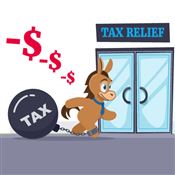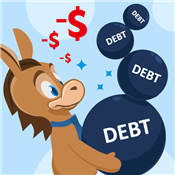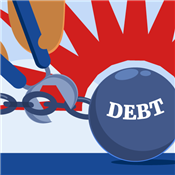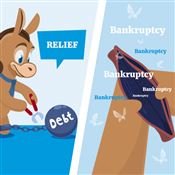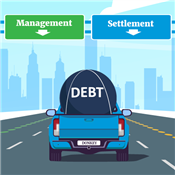National Debt Relief Review
Debts can spread your budget thin. But National Debt Relief may be able to help you out. Read on to learn how.
 | |||
Imagine Living Life Without Debt | |||
Overall Score | 4.3 | ||
Cancellation | 5.0 | ||
Customer Service | 3.5 | ||
Debt Relief | 4.5 | ||
Pros and Cons
- Personalized program
- Satisfaction Guarantee
- Pay off debts in 24-48 months
- Can be costly
- Negative credit impact
- $7,500 minimum debt to apply
Bottom Line
Accredited debt relief company that relieves various unsecured debts
Overwhelmed with debt? If you find yourself in a race against time, interest fees, and hidden charges, then you may be owing more and more money over the years.
That's where National Debt Relief comes in— one of the biggest debt relief companies in the United States.
In this article, learn how it works and how it compares to other debt relief services. Read on.
What Is National Debt Relief?
National Debt Relief offers debt relief services to help you lessen the debts that you owe. It's been in the industry since 2009, and primarily offers debt settlement and debt consolidation.
It has a solid track record in the business, helping over 550,000 clients since it started.[1] Plus, it has a wide partner network where you can access reputable credit counselors, bankruptcy services, and consolidation loans.
Most successful clients stay in their program for 24–48 months to settle all enrolled debts at significantly lower amounts.
On average, clients realize up to 50% of savings from their debts (30% including National Debt Relief's fees).
Imagine Living Life Without Debt
- Get a free savings estimate today
- See how quickly you can be debt free
- No upfront fees and no obligation
No, National Debt Relief does not work with the IRS. It does not provide any professional advice regarding tax matters or debt relief for tax debt. Other agencies cater to those specific services. National Debt Relief only relieves selected unsecured debts.
Thinking of opting for their services? Find out if you're eligible.
Who Is National Debt Relief For?
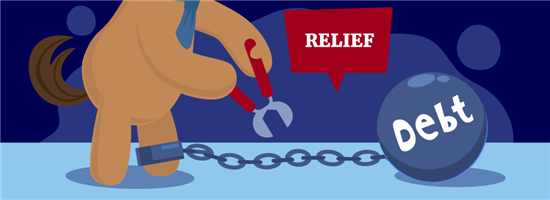 |
All companies have eligibility requirements before you can enroll in a program. National Debt Relief is for you if you:[2]
- Have legitimate financial hardship in settling debts, e.g., missing minimum payments, job loss, divorce
- Have over $7,500 in unsecured debt
- Owe credit card debts, medical bills, or personal loans
Unsecured debt is a debt that isn't secured by collateral. If you default on your payments, there are no assets tied to your debt that creditors can take. Some examples of unsecured debts are credit cards, federal student loans, or medical bills. In contrast, with secured debts like a car loan, the lender can take your vehicle if you miss your payments.
If you're wondering how National Debt Relief can help you, here's how it works.
How Does National Debt Relief Work?
Debt relief companies negotiate with creditors to help you reduce the debt you owe. It often involves intentionally missing your debt payments. The logic: creditors are more willing to settle at lower amounts than risk total default.
National Debt Relief process:
- Start by scheduling a free consultation to discuss your debt relief options and personalized program.
- Create an affordable plan based on what you can pay.
- You'll set up a dedicated escrow account where you will make your deposits for the entire program.
- National Debt Relief will negotiate with your creditors (this can take weeks to months to get the best reduced amount).
- If you approve the negotiated amount, you'll pay it using the accrued funds in your dedicated account.
If National Debt Relief cannot settle your debts or you're not satisfied, you don't pay anything. It's simple.
National Debt Relief could take anywhere from 24–48 months to negotiate for your enrolled debts in the debt relief program. But the total time it takes depends on who your creditor is, how much you owe, and the type of debt you have.
Imagine Living Life Without Debt
- Get a free savings estimate today
- See how quickly you can be debt free
- No upfront fees and no obligation
Find out which of your debts National Debt Relief can cover.
What debts does National Debt Relief cover?
Most debt relief companies only cover selected debts and loans. National Debt Relief covers the following unsecured debts:[3]
- Major credit cards
- Department store cards
- Gas cards
- Bank loans from prior banks
- Installment loans
- Finance companies
- Unsecured personal loans
- Repossessions
- Qualified business debts
- Bank, overdraft, and associated fees
- Cell phones (not currently used)
- Veterinarian bills over $500
- Credit unions (members who are not federal or military employees)
- Abandoned timeshares with current statements
- Judgments that are older than 6 months
- Back rent (not a current resident)
- Certain student debts
National Debt Relief cannot assist with the following debts:
- Mortgage loans
- Auto loans
- Child support
- Back taxes
- Speeding tickets or fines
- Current phone plans
- Current litigation accounts
- NSF (insufficient funds) checks
- Gambling debts
- AAFES or STAR (military)
- Credit repair bills
- Rent-a-Center bills
- Warranty contracts
- Insurance policies
- Check cashing establishments
- Bail bonds
- Newly taken/high cash advances, balance transfers and luxury purchases
- Other debts that are not eligible depending upon consultation
Although National Debt Relief will help lower your debt amount, there are things the company won't do. Read on.
What National Debt Relief Does Not Do
Note that National Debt Relief does not:
- Assume consumer debt
National Debt Relief cannot pay off your debts. It's a debt relief service to help you decrease the amounts you owe; it cannot take over and assume the debt obligation from you. - Make the monthly payment to your creditors
National Debt Relief negotiates for you to lower your debts and potentially get new terms. You must approve the new settlement amount in your portal and pay your creditors from your dedicated savings account. - Provide tax, bankruptcy, accounting, or legal advice
National Debt Relief does not offer professional tax services. It is also not a law firm with attorneys and paralegals to give you legal advice on bankruptcy options.National Debt Relief does have a partner network. If you need other services, talk to National Debt Relief for more options. It's best to do this during your free consultation, where you find all your debt options. - Repair credit
National Debt Relief cannot improve your credit report and credit score. You can instead opt for credit repair apps, credit builder apps, or credit repair companies like Credit Saint to improve your credit.
Now that you know what the company doesn't do, here are the services National Debt Relief actually offers.
National Debt Relief Services
National Debt Relief offers 2 types of services to help you out:
- Debt Settlement
Debt settlement refers to negotiating with creditors to reduce the debt you owe. The goal is to settle for the amount you can afford to pay off in more favorable terms.This can help you improve your debt situation and avoid bankruptcy down the road.
Bankruptcy vs. Debt Relief
Bankruptcy can be another form of debt relief. However, not all debt relief companies will offer bankruptcy services. Only some specialize in this service since it is a complex case. National Debt Relief doesn't offer bankruptcy services, but it does have a partner network that can offer one. - Debt Consolidation
Debt consolidation refers to merging all enrolled debts into one, so you settle one payment every month. Ideally, this eliminates other costs involved with each debt.One method of debt consolidation is a consolidation loan, which is a large loan to settle multiple debts. It is favorable for covering high-interest debts as the total of each debt can snowball just from missing a few individual payments.
A consolidation loan works best if it has a lower interest rate and better terms than your individual debts. The catch is that a consolidation loan has stricter requirements since you will borrow a large amount of money. Lenders will check your credit and financial capacity before lending you a big amount.
Essentially, in debt settlement, you reduce the debt by lowering the debt amount. In debt consolidation, you reduce the debt by avoiding any fees and charges that accumulate per debt.
Here's how much a service can cost you.
Cost of Services
National Debt Relief service fees range from 15–25% of your enrolled debt.[4] The fees are part of your monthly payments to your dedicated account.
But here's the deal: National Debt Relief's service revolves around negotiating with creditors. It will not charge you any service fee unless you approve the settled amount for your enrolled debt.
Also, National Debt Relief does not charge any of the following:
- Consultation or assessment fee
- Sign-up fees
- Cancellation fees
- Any form of an upfront fee before you agree with the negotiation amount
Debt relief companies operating a scam always have common red flags. According to CFPB, you need to look out for the following:[5]
- Any debt relief company requiring an upfront fee is breaking the law
- Claims to settle all your debt or a specific debt percentage off
- Promotes a "new government program" for bailing out credit card debt
- Guarantees it can settle and negotiate with all your creditors
- Requests you NOT to communicate with your creditors
- Tells you that it can stop lawsuits
No service is perfect, including National Debt Relief's services. So it's best to weigh the pros and cons of what they offer.
Pros and Cons
Pros
- Pay off your debts in as fast as 24 months
- Reduce or eliminate the interest on your debt
- There are no credit score requirements
- The satisfaction guarantee provides protection for your payments
- You can avoid bankruptcy
- Consultation is free
- Many types of unsecured debts are covered
- There are free tools to help you learn more about debt like blogs and calculators
Cons
- Creditors can file a case against you for missing payments
- Can severely impact your credit score
- No guarantee that you can relieve your debts
- Does not cover all types of student loans
- Unless you reach a settlement agreement with your creditors, you will continue to gain more interest, penalties, and charges
- Must meet the minimum debt requirements
Even though there are cons, is it still a good option? Read on to find out.
Is National Debt Relief Worth It?
National Debt Relief can help you reduce debt and pay it off faster, giving you back your financial freedom.
For example, if you only make the minimum credit card payments every month, it may take 10-20 years to pay it off. But the average customer can get out of debt in 24-48 months with National Debt Relief.
However, there are downsides, so it may not always be worth it.
For one, a debt relief program can drag down your credit score. Your creditors may also file a case against you for missed debt payments. Plus, you can owe taxes if the forgiven portion of your debt is more than $600 (per debt).[6]
The long-run costs are some risks you need to consider. In the end, they may end up not saving you money.
- Say National Debt Relief manages to negotiate 40% off your debts. Your debts are now reduced to $12,000.
- National Debt Relief charges up to 25% (based on your enrolled debt) as fees. So, you may end up paying up to $5,000 in fees.
Want to know if National Debt Relief has an established reputation in its industry? Read on.
Is National Debt Relief Legit?
National Debt Relief is a legitimate company, and it's been in the industry since 2009.
Its reputation is not only backed by thousands of people it worked with. It also has accreditation and memberships on:[7]
- Better Business Bureau: A+
- American Association for Debt Resolution (AADR)
- International Association of Professional Debt Arbitrators (IAPDA)
It means that many entities and organizations recognize National Debt Relief. It's affiliated with many organizations that impose strict compliance requirements in offering debt relief to consumers.
That said, one of the best ways to know a company is by finding out what clients or customers have to say about them.
Customer Reviews
National Debt Relief has negotiated and relieved millions of debts. Here are some verified National Debt Relief reviews from clients:
| PLATFORM | AVERAGE RATING |
|---|---|
| Consumer Affairs | 4.90 out of 5 ★ from over 50,000 reviews |
| Trustpilot | 4.70 out of 5 ★ from over 37,000 reviews |
| Google Reviews | 4.60 out of 5 ★ from over 7,000 reviews |
| Better Business Bureau (BBB) | 4.73 out of 5 ★ from over 3,000 reviews |
For some clients, National Debt Relief has changed their lives for the better. Talisa recounts how National Debt Relief has reduced one of the debts to more than half the original amount.
However, not all clients had a pleasant experience with National Debt Relief. Humberto's experience indicates a slow response from National Debt Relief's side.
Convinced to sign up with National Debt Relief? Start with the following steps.
How To Sign Up For National Debt Relief
If you have over $7,500 of unsecured debt, here's how to get started with National Debt Relief.
- Sign up for your free consultation here.
- Fill out how much you owe and some basic information.
- Work with a dedicated debt expert on a personalized plan.
For any concerns, here's how to contact National Debt Relief.
How To Contact National Debt Relief
National Debt Relief has limited availability in its contact channels. Support for existing clients is available by phone from Monday to Friday: 08:00 AM to 10:00 PM EST.[8]
If you're not yet enrolled, you can contact their debt specialists Monday to Friday: 8:00 AM to Midnight ET; Saturday and Sunday: 8:00 AM to 10:00 PM. ET.
- Phone: 800-300-9550 (for free initial consultation);
888-660-7427 (for current clients) - Email: success@nationaldebtrelief.com
- Address: 180 Maiden Lane, 30th Floor, New York, NY 10038
Before you finalize your decision of signing up, remember that National Debt Relief can affect your credit score.
Does National Debt Relief hurt your credit?
Yes, enrolling in a National Debt Relief program can hurt your credit. The only way National Debt Relief can negotiate with your creditors for a lower amount is if you demonstrate that you can't make your payments.
This means you need to stop paying your due balances. This will result in missed payments, late payments, or collections in your report, which can drag your credit score.
Does National Debt Relief not fit the bill? You have other options.
National Debt Relief Alternatives
Although National Debt Relief is a 2-in-1 option, its alternatives may fit your needs better.
Debt Management
Debt management refers to a structured repayment plan tailored to your financial situation. You can enroll in a debt management plan (DMP) through credit counseling agencies. During your initial consultation, you'll discuss your budget and debts.
The goal of your credit counselor is to come up with a monthly payment you can commit to in the next 3–5 years. They will negotiate with your creditors to enroll the debt in your DMP, remove interest, and waive fees. What's more, you can also request to negotiate new terms.
DIY Debt Settlement
Instead of signing up with a debt settlement company like National Debt Relief, you can consider doing the DIY approach on your own. No need to pay significant fees for relying on companies who negotiate on your behalf.
However, this also means you will be the one corresponding with your creditors. You can send a letter to your creditor or call them with a request to reduce your debt, provide evidence of financial hardship, and negotiate for the amount you can afford to settle.
Bankruptcy
Bankruptcy is a legal process that discharges your debts. Plus, you get to invoke the automatic stay where your creditors are not allowed to contact you in any way about your debts. You can choose between a Chapter 7 and Chapter 13 bankruptcy.
For Chapter 7, you file for a bankruptcy petition and wipe your debts off within 6 months. However, if you have assets, the court may liquidate your assets to use as payment for your creditors.
For Chapter 13, you propose a restructured repayment plan for 3–5 years. If you have a steady income and keep your assets safe, you can propose a plan to repay your creditors.
Accredited Debt Relief
Accredited Debt Relief only offers debt consolidation options. So, you'll focus on paying off one large monthly amount, covering all your other debts. Expect to have more stringent requirements, especially for large debt consolidation loans.
Similar to National Debt Relief, Accredited Debt Relief also aims to settle debt within 24-48 months.[9] However, it imposes a higher minimum debt requirement. To qualify with National Debt Relief, you need a minimum of $7,500 in unsecured debt, whereas Accredited Debt Relief requires at least $10,000.
National Debt Relief and Accredited Debt Relief cost 15–25% of your enrolled debts. But Accredited Debt Relief only covers the following:
- Credit cards
- Personal loans
- Department store credit debt
- Medical debt
Freedom Debt Relief
Freedom Debt Relief only offers debt settlement. Professionals will negotiate with your creditors to reduce any of the following:
- Credit cards
- Medical bills
- Department store cards
- Private student loans
- Some business debts
Freedom Debt Relief partners with the Legal Partner Network — ideal if any of your creditors want to sue you. You can access debt negotiators to negotiate for lower payment if your debt undergoes litigation. The best part is the fees are already part of your program. No need to pay extra bucks for legal services.
Like National Debt Relief, Freedom Debt Relief charges 15–25% of your enrolled debts as your service fee. You'll also need to miss the succeeding months of your debt payments if you haven't already.[10]
All states have a statute of limitations (SOL) when taking legal action against you. A statute of limitation is the allowable time creditors can file a case against you. It ranges from 3 to 6 years from the date of your delinquency (date of your last payment). If your creditor only decides to take legal action beyond the SOL, they can't file a case against you.
Bottom Line
National Debt Relief continues to offer a way for individuals seeking financial freedom. It has a solid track record for debt relief and continues to help more clients reduce their debt.
Results will vary depending on your situation. But don't forget that there's hope, and having large debts does not mean you don't deserve to get reliable service for your situation.
References
- ^ National Debt Relief. Our Track Record, Retrieved 10/4/2023
- ^ National Debt Relief. Qualifications, Retrieved 10/4/2023
- ^ National Debt Relief. Qualifications, Retrieved 09/15/23
- ^ National Debt Relief. FAQs: What will your service cost me?, Retrieved 10/4/2023
- ^ CFPB. What is a debt relief program and how do I know if I should use one?, Retrieved 08/17/2023
- ^ IRS. About Form 1099-C, Cancellation of Debt, Retrieved 10/4/2023
- ^ National Debt Relief. Accreditations, Retrieved 10/16/23
- ^ National Debt Relief. Contact Us, Retrieved 09/15/23
- ^ Accredited Debt Relief. Why choose us, Retrieved 10/21/2023
- ^ Freedom Debt Relief. FAQ: How much does debt relief cost?, Retrieved 10/16/23
Imagine Living Life Without Debt
- Get a free savings estimate today
- See how quickly you can be debt free
- No upfront fees and no obligation
Write to Alex Mambaje at feedback@creditdonkey.com. Follow us on Twitter and Facebook for our latest posts.
Note: This website is made possible through financial relationships with some of the products and services mentioned on this site. We may receive compensation if you shop through links in our content. You do not have to use our links, but you help support CreditDonkey if you do.
|
|
| ||||||
|
|
|
Compare:
